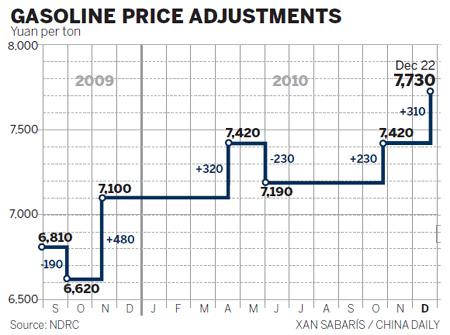
China will raise gasoline and diesel prices 310 yuan (about 46 U.S. dollars) per tonne and 300 yuan per tonne, respectively, beginning Wednesday, the National Development and Reform Commission(NDRC) announced Tuesday.
The is the second increase in fuel prices in two months after the NDRC raised the price of gasoline by 230 yuan and diesel by 220 yuan in October.
The adjustment would raise the benchmark retail price of gasoline by 0.23 yuan per liter and diesel by 0.26 yuan per liter, the country's top economic planning body said in a statement on its website.
The crude oil price had climbed to 88.81 U.S. dollars per barrel in West Texas Intermediate while Brent North Sea crude oil jumped to 92.74 U.S. dollars per barrel as of Monday, a record high since October 2008, according to the NDRC.
In the past two months, international oil prices had increased more than 8 percent.
The Chinese government adopted an oil pricing mechanism at the start of 2009 that allows the NDRC to adjust retail fuel prices when the international crude oil price changes by more than 4 percent over 22 straight working days.
However, the fuel price hike was still unexpected as China is facing tremendous rising inflation pressure, with the country' s consumer price index(CPI), a measure of inflation, accelerated to a 28-month high in November of 5.1 percent.
But the government promised that the price move would not further worsen inflation, as the NDRC roughly estimated that the rise would only add 0.07 percentage points to December' s CPI level, according to the statement.
Liu Zhenqiu, vice director of the NDRC's price department, said the NDRC had considered "the current consumer price level and the overall supply and demand condition in the domestic oil market" and postponed the price hike, which also did not exactly follow the international price trend.
Market observers also said the fuel price hike would have limited effect on the country's consumer price levels but, rather, place pressure on the consumer sentiment, as the government had already worked hard to retain surging prices.
Lin Boqiang, director of the China Center for Energy Economic Research at Xiamen University, said the price hike was a "modest one", compared with the huge price increases in the international oil market.
According to Qi Yuqin, analyst with Zhuochuang Information Service, the price move would somehow raise China's price level with particular influences on transportation and logistics sectors, but the impact would be very little on farm products.
Food prices account for one-third of China's monthly CPI calculations and had contributed to three-quarters of November's year-on-year jump in inflation.
The NDRC also promised that subsidies would be given to low-income families, farmers, taxi drivers and other sectors that could be hurt by the price adjustment.
Public transportation systems, including buses, railways and airlines, are not allowed to raise fuel surcharges after the price hike, the statement said.
The NDRC explained that the rise in fuel prices was actually a move to restrain rapid increases in the country's oil consumption and boost energy conservation, as the department estimated that China's dependence on imported oil is likely to hit 55 percent by the end of this year, from 33 percent in 2009.
China's apparent oil consumption - domestic production plus imports minus exports - jumped 15.2 percent year on year to 20.07 million tonnes in November this year, the NDRC announced earlier Tuesday.
China's dependence upon imported oil was about 53 percent in the January to November period, said the NDRC.
Many parts of China had also been hit by unprecedented diesel shortages this winter as international oil prices jumped and enterprises have to resort to diesel fuel to generate electricity to continue operation during periods of forced power outages.





